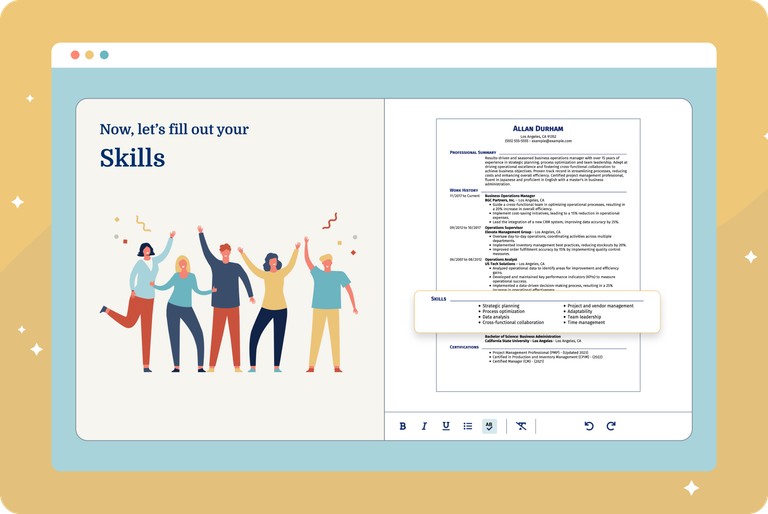Project Management Skills: Examples for Your Resume

Our customers have been hired at: *Foot Note
Whether you work in the corporate world, manage a small business, or lead a nonprofit organization, project management skills are essential for ensuring smooth operations and successful outcomes.
In this guide, we’ll explore the skills, certifications, and tools you need to develop a strong project management skill set that can set your resume apart.
AI Resume Skills Generator

What Are Project Management Skills?
Project management skills encompass a broad range of abilities and competencies essential for effectively planning, executing, monitoring, and closing projects.
Here are a few basic project management skills you can consider including when creating your resume:
- Leadership: Effective project managers lead by example, which requires strong leadership skills to inspire team members and motivate them to achieve project goals.
- Time management: Project managers must prioritize tasks, set deadlines, and allocate resources effectively to ensure timely project completion.
- Organization: Being organized is crucial for managing timelines, so project managers need strong organizational skills to manage resources and tasks efficiently.
- Risk management: Anticipating and mitigating risks is essential to minimize project disruptions.
- Problem-solving: Projects often encounter unexpected challenges, which calls for strong problem-solving skills to find creative solutions.
- Team building: Building and managing a cohesive project team is crucial for success. Project managers should foster collaboration and resolve conflicts.
These are just some of the professional skills project managers use to effectively plan and deliver successful projects. Explore more examples of skills needed for project management below.
Here is an example of how to list project management skills on a resume:
See the following pages for additional samples demonstrating how to list project management skills on your resume:
Project Management Skills Examples
Browse these project management skills lists to see which best describe your abilities and use them to boost your resume.
Project management hard skills
- Project scheduling: Proficiency in developing and managing project schedules using tools like Gantt charts or project management software.
- Budgeting and cost management: Understanding of budgeting principles and cost estimation techniques to ensure projects stay within budget.
- Quality management: Knowledge of quality assurance and quality control processes to ensure project deliverables meet predefined quality standards.
- Resource management: Ability to allocate and manage project resources effectively, including human resources, equipment, and materials.
- Project management software: Proficiency in using project management software tools such as Microsoft Project, Asana, Trello, or Jira to track project tasks.
- Procurement and contract management: Understanding of procurement processes, contract negotiation, and vendor management to acquire necessary goods and services.
- Earned value management (EVM): Knowledge of EVM techniques to measure project performance and progress based on earned value, planned value, and actual cost.
- Data analysis and reporting: Ability to collect, analyze, and interpret project data to generate reports and make informed decisions to support project objectives.
- Critical path method (CPM) and program evaluation and review technique (PERT): Understanding of CPM and PERT techniques for scheduling and managing projects.
Explore the top soft skills and hard skills that you can include on your resume to stand out from other applicants.
Project management soft skills
- Communication: Verbal and written communication skills allow professionals to convey information clearly, listen actively, and foster open communication among team members.
- Empathy: Capacity to understand and empathize with team members' perspectives, needs, and concerns, fostering a supportive and inclusive project environment.
- Conflict resolution: Ability to identify and address conflicts within the project team or among stakeholders, facilitate constructive dialogue, and find solutions.
- Negotiation: Proficiency in negotiating with stakeholders, team members, or vendors to resolve disputes, secure resources, and reach agreements.
- Adaptability: Flexibility and openness to adapt to changing project requirements, priorities, and circumstances, and the ability to guide the team through transitions.
- Decision-making: Capacity to make timely and well-informed decisions based on available information, considering potential risks, impacts, and stakeholder interests.
- Delegation: Capability to delegate tasks effectively, empower team members, and provide guidance and support while entrusting them with responsibilities.
- Client management: Ability to build and maintain positive relationships with clients and manage client communications and expectations throughout the project life cycle.
- Feedback and coaching: Skill in providing constructive feedback and mentorship to team members to enhance their performance.
Project management technical skills
- Methodologies: Familiarity with various project management methodologies such as Agile, Waterfall, Scrum, Kanban, and Lean, and understanding when and how to apply them based on project requirements.
- Processes: Knowledge of project management processes defined by standards such as the Project Management Institute's (PMI) Project Management Body of Knowledge (PMBOK) or PRINCE2.
- Work breakdown structure (WBS): Skill in creating a hierarchical decomposition of project tasks and deliverables to facilitate planning, estimating, and tracking project progress.
- Gantt charts: Proficiency in creating and interpreting Gantt charts and strong cognitive skills to visualize project schedules, task dependencies, milestones, and resource allocation.
- Risk management tools: Familiarity with risk management tools and techniques such as risk registers, risk matrices, qualitative and quantitative risk analysis, and risk response planning to identify, mitigate, and monitor project risks.
- Quality management tools: Familiarity with quality management tools and techniques such as quality checklists, flowcharts, Pareto charts, and statistical sampling methods to ensure project deliverables meet predefined quality standards.
- Document management systems: Proficiency in using document management systems or collaboration platforms to store, organize, version control, and share project documentation, reports, and communication.
Check out our library of 800+ resume examples to see how other project managers showcase their skills.
How to Improve Your Project Management Skills
Developing project management skills requires a combination of learning, practice, and refinement over time.
Here’s how you can hone your project management to develop your career further:
- Education and training: Invest time in learning about project management methodologies, tools, and best practices. You can take courses, attend workshops, and earn certifications such as PMP (Project Management Professional) or PRINCE2.
- Practical application: Apply what you learn by managing real projects. Start with smaller projects and gradually take on larger ones as you gain confidence and experience. Don't be afraid to make mistakes; they're valuable learning opportunities.
- Develop leadership skills: Develop leadership skills to motivate and inspire your project team. Provide clear direction, support, and guidance to help team members perform at their best.
- Adapt to changes: Be flexible and adaptable in your approach to project management. Projects rarely go exactly as planned, so be prepared to adjust your strategies and plans as needed to address unexpected challenges or changes.
- Utilize technology: Take advantage of project management tools and software to streamline processes, track progress, and collaborate more effectively with your team.
How to Highlight Project Management Skills on Your Resume
Project management is a high-income skill that is highly sought after by employers.
Highlighting your project management skills effectively can help you stand out from the competition.
Here are some tips to help you get started:
- Create a skills section: Craft a skills section near the top of your resume and include your project management skills. This section should be easily noticeable and can include a concise list of your key skills.
- Use keywords: Incorporate relevant keywords related to project management throughout your resume. Including keywords from the job description can help your resume get past applicant tracking systems.
- Quantify your achievements: Whenever possible, quantify your project management achievements with specific metrics or numbers. For example, mention how you improved project efficiency by a certain percentage.
- Provide examples: In your resume work history section, include specific examples of projects you've managed and your contributions to their success. Describe your role, the project objectives, the challenges you faced, and the outcomes you achieved.
Common Tools Used for Project Management
Effective project management skills require an understanding of common tools used to facilitate project planning, execution, and monitoring.
Here are a few examples of project management tools and technologies:
- Project management software: Platforms like Microsoft Project, Asana, Trello, Jira, Basecamp, and Monday.com.
- Collaboration tools: Tools like Slack, Microsoft Teams, and Zoom enable real-time communication, file sharing, and collaboration among project team members.
- Time tracking software: Applications such as Toggl, Harvest, and Clockify allow project team members to track the time spent on various tasks and activities.
- Issue tracking tools: Platforms like Jira, Bugzilla, and GitHub Issues help manage and track software bugs, defects, and issues throughout the project life cycle.
- Resource management software: Software such as ResourceGuru, Float, and Mavenlink helps project managers allocate and manage resources.
- Financial management software: Tools like QuickBooks, FreshBooks, and Xero help track project budgets, expenses, and financial transactions.
These tools and technologies can streamline project workflows, improve collaboration, enhance communication, and increase overall project efficiency and effectiveness.
Best Project Management Certifications
The best project management certifications often depend on factors such as your career goals, industry, and level of experience.
Here are some widely recognized project management certifications:
- Project Management Professional (PMP)
- Certified Associate in Project Management (CAPM)
- PRINCE2 (Projects IN Controlled Environments)
- Certified ScrumMaster (CSM)
- PMI Agile Certified Practitioner (PMI-ACP)
- Certified Project Manager (CPM)
- Agile Certified Practitioner (ACP)
- Certified Project Management Professional (CPMP)
Explore our resume templates library to find a design that will help you highlight your project management certifications in your resume.
Key Takeaways
- Project management skills are essential for successfully planning, executing, and completing projects within scope, budget, and schedule constraints.
- Key project management skills include communication, leadership, time management, stakeholder management, risk management, and adaptability.
- Project managers should continuously seek opportunities to enhance their project management skills through education, training, and practical experience.
- Project management tools and technologies can streamline project workflows, improve collaboration, and enhance overall project efficiency and effectiveness.
FAQ
What are the most important project management skills?
While all project management skills are important, some are particularly critical for ensuring project success. Here are a few essential project management skills:
- Communication
- Leadership
- Time management
- Stakeholder management
- Problem-solving
- Risk management
- Adaptability
- Negotiation
- Critical thinking
Continuously developing these key skills allows project managers to effectively lead their teams, manage projects successfully, and deliver value to their organizations.
What makes a good project manager?
A good project manager possesses a unique blend of leadership and organizational skills that enable them to effectively plan and deliver projects on time and within budget.
Effective communication is a cornerstone of their success. They convey information clearly, listen actively to stakeholders and team members, and address conflicts and challenges.
Their problem-solving skills enable them to identify issues, analyze root causes, develop creative solutions to overcome obstacles and keep projects on track.
An effective project manager can inspire confidence and trust among their team members and stakeholders, ultimately delivering successful outcomes for their organization.
Our customers have been hired at:*Foot Note








